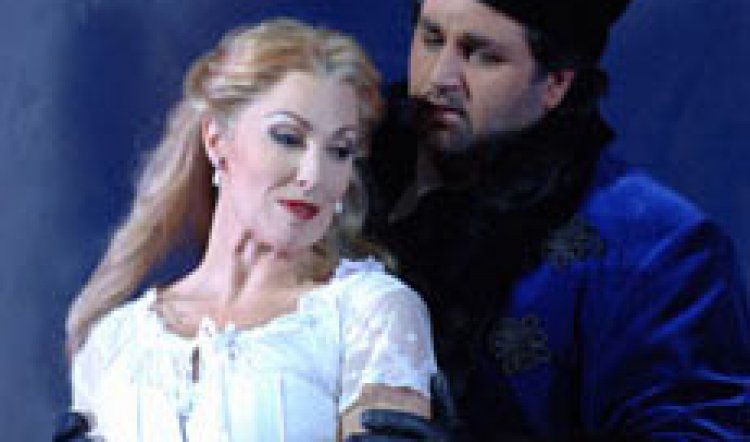
Rusalka
A new production should be cause for celebration at Opera Australia, particularly when it stars Cheryl Barker and Elizabeth Whitehouse. But this one - the company's first fully staged Rusalka and with Barker making her debut in the title role - was curiously muted, as was its opening night reception.
The production, directed by Olivia Fuchs, is actually from the UK's Opera North. It was originally designed by Niki Turner and Bruno Poet and is handsome at first sight but on reflection is a puzzle at many levels. First of all, Cheryl Barker - one of the finest actor-sopranos this country has ever produced - seemed uncomfortable in the role of the Sprite-who-would-be-Human for the sake of Love. As well she might: singing the adored, famous and hugely anticipated Song to the Moon is tricky enough without having to do it with legs bound into an approximation of a mermaid in bandages while prostrate on an oversize ice block.
She performed the aria beautifully but nevertheless was unconvincing as either the rusalka-sprite or Rusalka-rendered human and mute, which is odd, given her previous track record and considerable ability as an actress. Later in the piece, for instance, when her voice has been taken as the price she pays for her Prince, her struggles to communicate while voiceless are the most touching aspects of the evening. And it can't be forgotten that Barker was a sublime Cho-Cho San in Moffatt Oxenbould's Madama Butterfly, a once-in-a-lifetime Mimi in Baz Luhrman's La Boheme, a dream come to life for Neil Armfield as Katya Kabanova and a heartbreaking Violetta in La Traviata. So, on this occasion, you have to wonder about the director's interpretation of the dual aspects of the lead role and the bizarrely diverse design elements of the production overall.
Rusalka takes place between two realms: the watery world of the mythical sprites and a princely castle. Nevertheless, in this visually arresting version there is little difference between them. The glittering expanse of the fairy forest world - with a eskimo-like hole cut in the ice centre-stage - is relieved only by the already-mentioned giant ice blocks.
The ice is then rendered palatial by the addition of lengths of red carpet and there is scant sense of separate worlds. Which possibly makes the transition for Rusalka from one sphere to the other an uphill slog. And that even after her legs are unbound by Jezibaba, a forest witch who wields a giant syringe, a steel cart rattling with nasty appliances and a characterisation seemingly inspired by Bond villainness Rosa Krebs (Anne-Marie Owens). It's mildly amusing but adds another element of cultural and visual confusion.
[page]The trio of Wood Nymphs don't help either as they perform bootscooting routines got up like extras from Annie Get Your Gun. (Sarah Crane, Taryn Fiebig and Dominica Matthews are strong singers however and remarkably persuasive in suede boots and weskits.) Other nymphs are white-clad and shaven-headed ghosts (Antony and the Johnsons?) while the prince's courtiers are handsome in Cossack hats and sumptuous velvet greatcoats and winter gowns. The absence of visual logic may account for the dolorous weariness projected by Bruce Martin who sings splendidly in the role of Rusalka's father/Water Sprite despite making his first entrance on a Peter Brook-style swing, high above the ice.
The "rarely performed" aspect of Dvorak's retelling of the Czech folk tale might also be worth pondering. Why has Rusalka not joined the repertoire of continually programmed favourites? The music is melodic and mostly very easy on the ear and features one of the most beautiful and excerpted arias in all of opera. There are plenty of characters, plenty of story, plenty of singing. However, it does rely on that one great aria which falls in the first quarter, then remains as a tantalising motif but is never fully heard again. And there isn't another five minutes of music that comes anywhere close to it. On the other hand, other operas survive successfully as one-note sambas (indeed, Andrew Lloyd-Webber routinely constructs box office boomer musicals around one decent tune) so while Rusalka is musically tantalising, it isn't all that unusual. Again, it forces further scrutiny of the physical.
As well as visual peculiarity, the casting is also odd. The other major draw card of this production is Elizabeth Whitehouse. She is one of Australia's greatest exports to the world and we're lucky to have her home. The moment she appears, in sables and scarlet velvet, in the role of the Foreign Princess, the electricity ripples around the auditorium. Whitehouse is magnificent - so much so that her absence is almost more unbalancing of the whole than her presence (the role is not much more than a cameo).

As the faithless Prince who finally chooses to die for love of Rusalka, Rosario La Spina is almost too much of all that's required of a romantic lead. Heroic tenors are so rare and precious and La Spina's smile so sweet, the immediate response is to wrap him in cotton wool and make sure that voice is protected and nurtured. As it is, the delightful qualities of his instrument seem, at the moment, to be hedged about by wayward, forced and sometimes downright ugly elements. The trouble with pushing or bullying such a voice is that the options of crash or crash through are just not on. He needs road safety lectures if yet another promising tenor is not to simply crash and disappear.
On a brighter note - quite literally - the major role debut of Sian Pendry, in Just William haircut and breeches as the Kitchen Boy, is a vocal and histrionic event to savour. It doesn't seem that long ago when Suzanne Johnston or Emma Matthews were first making similar hopeful strides towards stardom. Pendry sounds and looks as promising.
The Opera and Ballet Orchestra's performance, with Richard Hickox conducting, is as solid as ever although - on opening night - a surprising number of duff horn notes suggested the icy wastes above had got to the players' chops; while the strings seemed even more ethereally distant than usual and the conductor simply looked grim throughout.
A funny old night with exquisite moments from Cheryl Barker, Elizabeth Whitehouse and Sian Pendry.
Rusalka, Opera Theatre, Sydney Opera House, Sydney to March 28, 2007; ph: (02) 9250 7111 or www.sydneyoperahouse.com



